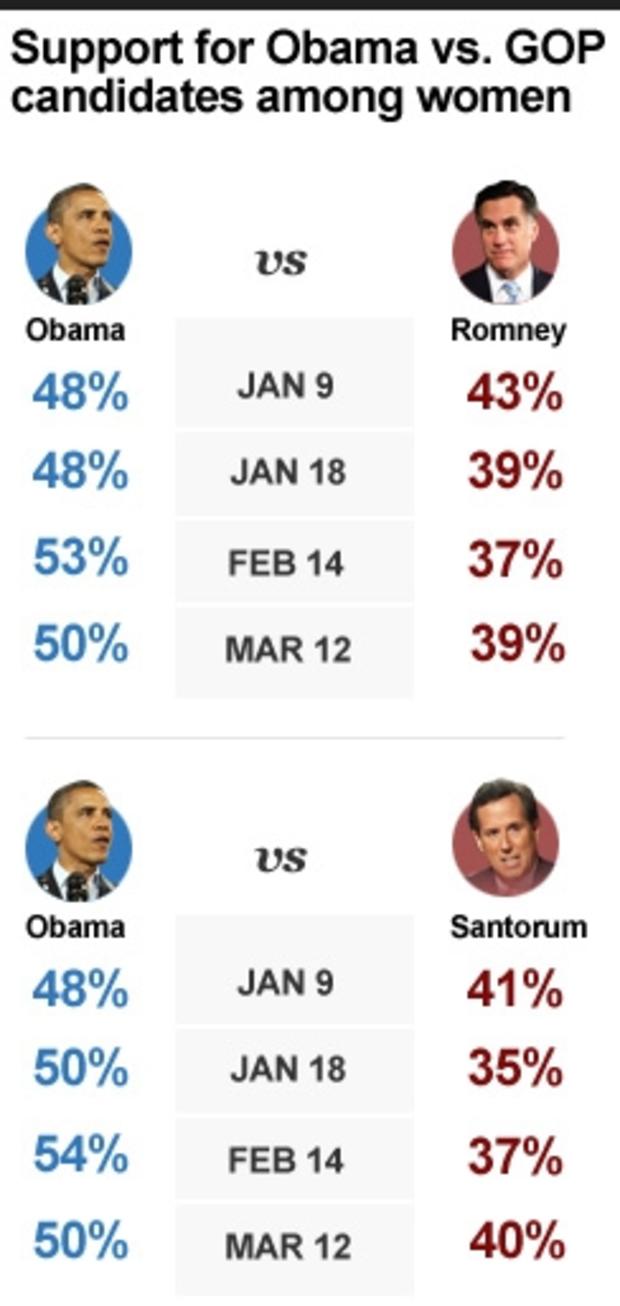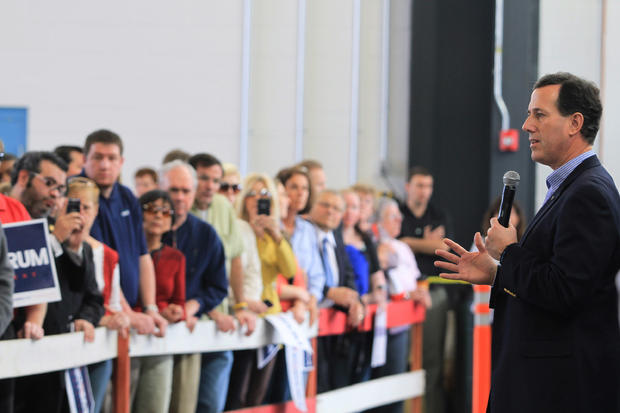Both sides see opportunity in women's health fights
Updated: 1:34 p.m. ET
(CBS News) Ahead of the 2012 elections, amid an ongoing series of debates related to contraception, abortion rights and women's health care, Democrats are sensing an opportunity.
"I think that we're headed for another 'year of the woman,'" New York Democratic Congresswoman Carolyn Maloney told Hotsheet in an interview.
Maloney, along with a number of her fellow Democratic Congress members and groups like the Democratic Senatorial Campaign Committee (DSCC), the Obama re-election campaign, Planned Parenthood, and the National Organization for Women (NOW) point to a slew of high-profile controversies -- including a scuffle between Planned Parenthood and the Susan G. Komen for the Cure Foundation, GOP-sponsored abortion bills in state legislatures, and a dispute over the administration's rules on mandating health care coverage for contraception -- as evidence of a Republican "war against women." And they're presenting themselves as the peaceful solution.
"The debate has really brought clarity to the fact that women's health needs are under attack by an increasingly conservative Republican party," Maloney told CBS. "I think it's much worse than I've ever seen before."
A winning issue for Democrats?
Democrats argue that Republicans, by repeatedly bringing up debates about women's health care, are presenting them with a clear opportunity to rally their base around ideological topics that have for decades served as cornerstone issues for the Democratic Party. They also contend the ongoing debate could help them hold on to the Senate -- and give Mr. Obama a boost among female and independent voters across the country.
"I think in states like Missouri and in the West, more Libertarian-leaning states like Montana, you're going to see that voters are rejecting this government overreach," said Matt Canter, a spokesperson for the DSCC. He cited independent women - a demographic he said "is likely to make up a majority of undecided voters at the end of the race" - as one group he sees trending toward Democrats in swing states like Colorado that have Senate contests coming up.
Terry O'Neill, president of NOW, which regularly supports Democrats, pointed to the Senate race in Massachusetts between incumbent Republican Scott Brown and the liberal consumer advocate Elizabeth Warren as one race where women voters could swing the pendulum in favor of Democrats.
"Young women are mobilizing. That's going to make a huge difference in that race," she said.
The DSCC recently launched an ad campaign urging voters to fight the GOP's "war on Women" by electing Democratic women like Warren to the Senate in 2012.
Meanwhile, Obama For America this week launched a multifaceted effort aimed at reigniting pro-Obama enthusiasm among women voters: Mailings are going out this week to a million voters in several states and there will also be a "Women's Week of Action" -- a coordinated field outreach program through Women for Obama -- at the end of the month.
The Obama campaign and the Democratic National Committee (DNC) have been aggressively targeting the president's Republican presidential rivals for their positions on social issues like abortion rights and contraception. The DNC on Thursday released a web video targeting presidential front-runner Mitt Romney as "wrong for women" due to his positions on women's health care. And in a Facebook post and email blasts on Wednesday, Obama for America blasted Romney for comments he made Tuesday about wanting to "get rid of" Planned Parenthood, though Romney later clarified that he does not want to eliminate Planned Parenthood completely, but rather strip it of government funding.
"Stand with the only candidate in this presidential race who respects women's health care choices -- Barack Obama," the Obama campaign email said. "We'll send a nice note to Romney's camp to let them know exactly how many people he fired up tonight by wishing Planned Parenthood, and affordable health care for millions of women, out of existence."
Will voters still care in November?
While Democrats are eager to cast debates over women's health issues as an opportunity to revive enthusiasm among the base, their success, ultimately, hinges on the extent to which voters continue to feel personally attached to and motivated by these issues.
Republicans argue the whole debate is overblown -- a Democratic attempt to divert attention from issues like rising gas prices and the economy.
Brian Walsh, spokesman for the National Republican Senatorial Committee (NRSC), used the Massachusetts Senate race as proof that the Democratic strategy is actually failing.
"They are desperate to talk about anything but the economy -- which is why they're searching for these red herring sort of issues," Walsh told Hotsheet.
Pointing to a handful of recent polls that put Brown, a moderate Republican who was elected with Tea Party support, ahead of the famously liberal Warren, Walsh argues that Democrats are overestimating the liberal values of their constituents -- particularly in states like Missouri and North Dakota.
"If you're a mother in Missouri or a mother in New York, where my mother is from, what you care most about is what type of country you're leaving for your children," Walsh said. "Women care about the same issues that everyone else does."
"At the end of the day, this election is going to come down to the economy," he said.
Andrea Saul, press secretary for the Romney campaign, echoed this sentiment in an email, contending that the Obama campaign's focus on the issue was an attempted distraction from what she called the president's "abysmal economic record."
"President Obama and his allies will try to make this election about anything besides his failures on the economy," Saul said. "Jobs and the economy are the most important issues to all voters - male and female alike - but President Obama knows he can't run on his abysmal economic record, especially against an opponent who has spent his life in the real world economy and has actually created jobs."
She added: "He and his team will throw out any distraction they can to divert attention away from his failed leadership."
Where does the data fall?
Polls show that voters overwhelmingly see the economy as the most important issue facing the country, though they also suggest Americans are paying attention to the debate over contraception.
According to a new Bloomberg poll, more than six in ten Americans believe that the debate over contraception is a matter of women's health care - not religious freedom, as many Republicans argue. That includes nearly seventy percent of women. An even larger majority of Americans - 77 percent - say the issue shouldn't even be a part of U.S. political discourse.
Whether that translates to help for Democrats is unclear.
In three CBS News polls between January and February, in which Mr. Obama was matched up separately to both Rick Santorum and Romney in a potential general election match-up, his margin of support among women over his rivals increased significantly. In January, Mr. Obama had a five-point margin over Romney and a seven-point margin over Santorum among women; by mid-February, the president was leading Romney by 16 points and Santorum by 17 points. Similarly, Mr. Obama's general favorability between January and February of 2012 increased slightly among women, from 51 percent to 53 percent.
By March, however, a CBS News survey showed that upward trend for Mr. Obama reversing: When stacked up against his GOP competitors in March, Mr. Obama led Romney by 11 points and Santorum by 10 among women. Meanwhile, his approval rating among women dropped dramatically, as it did across the board, to 41 percent.
Between February and March, there was also a drop in Mr. Obama's approval ratings among independent women from 49 percent to 33 percent.
It's impossible to determine the extent to which these debates may have impacted Mr. Obama's approval ratings among women, but it's worth noting that several of the most contentious recent debates - including the controversy surrounding Susan G. Komen and Planned Parenthood, and the beginnings of the public debate over the White House's contraception rule - took place between the end of January and mid-February. The contraception debate, however, spilled into March, inciting increased uproar when Rush Limbaugh called Sandra Fluke, a women's health activist, a "slut" and a "prostitute" for speaking out in favor of increased contraception coverage.
Moreover, a new CBS News/New York Times poll shows that 51 percent of Americans believe there should be an exception for employers who may have a moral or religious objection to covering birth control for their employees - which seems to suggest Americans support the prevailing Republican position on the issue. Forty percent say all employers should have to cover contraception. When asked specifically about religiously-affiliated employers, 57 percent of Americans said they should be able to opt out of the mandate if they have religious or moral objections. Thirty-six percent said such organizations should have to cover birth control.
Nevertheless, the overall impact of these controversies seems to hinge, at least in part, on whether or not the debates over women's health continue - and the extent to which voters remember them on Election Day.
What role will social conservatives play in the debate?
Democrats are not the only people with a possible reason to keep social issues on the agenda in 2012: Santorum, who is presenting himself as the conservative alternative to Romney in the Republican presidential race, has made his staunchly conservative social positions a cornerstone of his political career. Moreover, exit polls from recent primary contests show that he has the most appeal among evangelical and born-again Christian Republican voters, as well as those who prize a candidate's moral character.
In his ongoing primary battle against Romney - which is expected to drag on for months, if not all the way to the Republican presidential convention - Santorum could benefit from keeping social issues front and center.
Marjorie Dannenfelser, the president of the conservative group Susan B. Anthony List, which opposes abortion rights and is supporting Rick Santorum for president, says conservatives aren't going to back down.
"Women disagree on these issues," said Dannenfelser, who was on the Santorum campaign bus when Hotsheet spoke with her. "We should have a healthy debate over abortion, and a healthy debate over where their health care ought to come from."
Dannenfelser strongly disputed the notion that attempts to defund Planned Parenthood and to reverse the White House contraception rule amounted to a "war against women," and suggested it is offensive to women to assume that an entire gender be considered single-issue voters who vote as a group.
"We're not thinking 24-7 about where our next reproductive device is coming from," Dannenfelser said. She said it was "insulting" for Democrats to say "women are in the bag" as a voting bloc.
She also dismissed the idea that the debate over social issues like abortion and contraception will go away in favor of a focus on the economy.
"I think that's a very defensive response and one sorely lacking in vision," she said.
Indeed, for some Republican members of Congress, particularly conservatives who were elected with Tea Party support, standing strong on social issues is part of what they see as an electoral mandate.
"Democrats are disingenuously attempting to turn what is truly an argument on religious freedom into an entirely different debate," said freshman congresswoman Sandy Adams, a Florida Republican and Tea Party member, in an email to Hotsheet. "The unconstitutional [contraception] mandate is a warning sign about how one-size-fits-all healthcare requirements will directly conflict with religious liberty. I am confident that Americans will see through the Democrats attempts to disguise what this argument is truly about."
Added Danenfelser: "Of course [economic issues] will impact voters, but to not see [the contraception debate] as the fundamental threat to liberty that grassroots people do is a huge mistake. That response is based on fear that there is no way to win [the argument]. Whoever the nominee is, they will have to be able to communicate what this debate is really about."
Messaging matters
If Dannenfelser is right, and social issues remain prominent in the political conversation over the coming months, the impact of the debate could very well depend on the extent to which the candidates are able to control the message.
"One of the arguments [over the contraception rule] is about whether government should pay for contraception related services. It's something that both parties can use to motivate their respective supporters. But when it becomes an argument about saying nasty things about college students then it alters the playing field pretty dramatically," said Dan Schnur, a former Republican strategist who is now the director of the Jesse M. Unruh Institute of Politics at the University of Southern California.
"One of President Obama's greatest challenges in 2012 is motivating the Democratic base. This controversy helped the Obama campaign with at least two of those groups - young people and women," Schnur added.
Regardless of the possible political merits associated with continuing the conversation, members of Congress from both sides of the aisle believe it's important to stay engaged due to what they see as certain ideological imperatives.
"The size and role of the federal government and whether the health care law is trampling on the freedoms given to us by the Constitution must be debated and discussed," said Republican Rep. Diane Black, a first-term congresswoman from Tennessee and member of the Tea Party caucus.
Rep. Maloney described it differently: "It's important for Democrats to fight for women's health. It's half the population."


